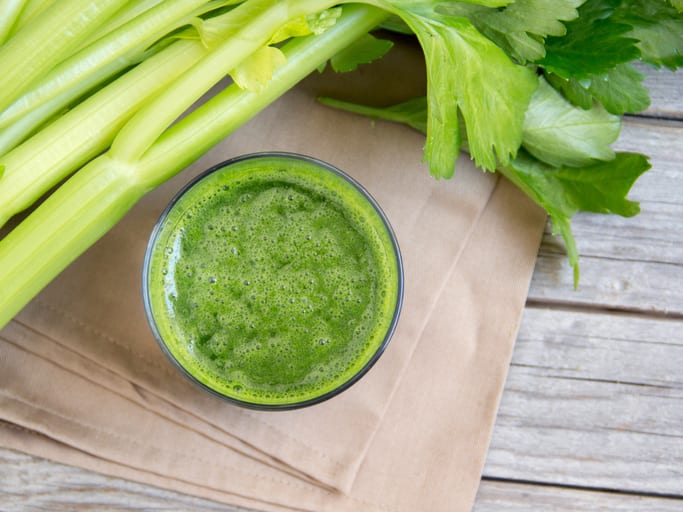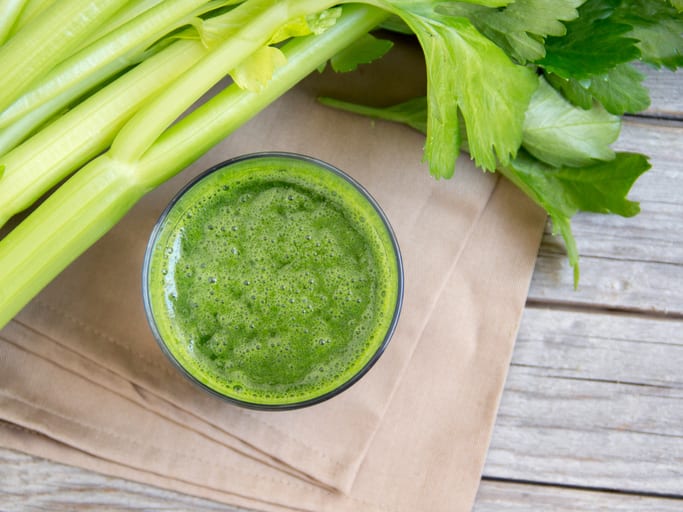Clean 21: 21 Day Detox
Our Signature 21-Day Full-Body Reset
Questions? Ask about this product
Free Shipping On Orders Over $50
Complementary products


Celery juice – the miracle green juice that is taking over everyone’s social media feed. Have you tried it yet? Celery juice is popping up all over the place as a “cure-all” for everything from digestive issues to skin conditions. People all over the world are posting about their experiences with drinking celery juice every morning, claiming it has helped IBS, constipation, migraines, adrenal fatigue, asthma, Lyme disease, and more. The recent popularity among many celebrities has made it even more of a health trend.
There is no doubt, eating whole, unprocessed foods, especially vegetables, is good for our health. We believe it, we practice it, and we teach it. However, we should be wary when it’s communicated that a specific singular food can directly treat an illness, especially when there’s not much evidence to back up these claims.
Celery Juice Benefits
Drinking celery juice is safe. It’s a naturally whole food! The ingredient consists of simply celery and nothing else. Celery contains many vitamins like vitamin K, vitamin C, potassium, folate, manganese, calcium, riboflavin, magnesium, and vitamin B6. It also has a high percentage of water and electrolytes that can help prevent dehydration (and we know how important proper hydration is).
Celery, because of compounds such as caffeic acid, p-coumaric acid, ferulic acid, apigenin, luteolin, tannin, saponin, and kaempferol, has powerful antioxidant characteristics, to remove free radicals. Consuming antioxidant foods can decrease the risk of getting chronic illnesses.

It can also help prevent cardiovascular diseases, jaundice, liver disease, urinary tract obstruction, gout, and rheumatic disorders. Celery can even reduce blood glucose levels, blood lipids, and blood pressure. Experimental studies show that celery has antifungal, antibacterial, and anti-inflammatory properties. Celery seeds have been shown useful in the treatment of bronchitis, asthenopia, asthma, and chronic skin disorders, including psoriasis. Also, the root of the celery is diuretic and it is used for the treatment of colic.
In general, there isn’t much scientific evidence to show that juicing is any better than eating whole foods. When we eat whole fruits or vegetables, we’re getting the benefit of the fiber, as nature intended, which helps move food through our systems and helps feed the good gut bacteria. We miss out on this with juicing. This is why we love our smoothies and shakes. They contain tons of fiber, along with all the good nutrients that we need. There is also no scientific evidence that supports the healing benefits of celery juice specifically.
In conclusion:
Celery juice is rich in nutrients. The benefits are there. It can be a helpful part of your health routine. Is it a miracle juice that is going to cure all of your problems? Probably not.
There is no replacement for consistently eating a well-rounded, healthy, whole foods-filled diet. One single juice in the morning won’t make up for an entire day of unhealthy eating. It’s always about the full picture, including movement, mindfulness, and sleep. However, celery juice, and any green vegetable juice, can be a great way to get some extra hydrating nutrients into your diet. We also recommend rotating your greens regularly to optimize nutrition: spinach, watercress, kale, bok choy, parsley, cilantro, and arugula – they are all good!
Try throwing some celery in your next Daily Shake to make sure you get all the antioxidant benefits of celery and the important fiber it contains.
If you hopped on the celery juice train, and have noticed positive effects from it, then stick to it! Feeling good is the goal at the end of the day. Just make sure you’re eating other fruits and veggies too.
Written by Hannah Aylward
If you enjoyed this article, you might also like A Powerful Ginger Juice You Need to Make
Sources:
A Review of the Antioxidant Activity of Celery